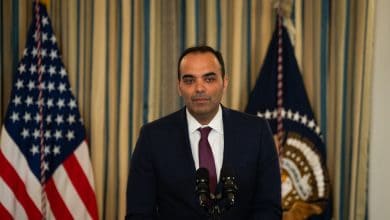Top Editor at The Atlantic Will Moderate ‘Washington Week’

PBS announced Wednesday that Jeffrey Goldberg, the editor in chief of The Atlantic, would be the next moderator of “Washington Week,” the Friday evening public affairs show that is a staple among policymakers in the nation’s capital.
The Atlantic will co-produce the show, which will be renamed “Washington Week With The Atlantic.” The magazine will cover some of the costs and help to sell sponsorships.
Mr. Goldberg, who has been at The Atlantic for more than a decade — its former owner, David Bradley, recruited him in 2007 with a team of ponies — said he believed there were still enough viewers who cared about in-depth analysis of consequential issues to make the show a success.
“The good thing is, there’s an awful lot of Americans, and I don’t need all of them to come here,” Mr. Goldberg said. “We just need five or 10 million.”
Ratings for “Washington Week” have slumped in recent years, as traditional TV viewership has fallen industrywide, and its revenue has followed. The show averaged 845,000 viewers in April, according to Nielsen, a 22 percent decline from the same period in 2015, when it was moderated by the journalist Gwen Ifill. The company’s corporate sponsorship has declined roughly 10 percent since 2019, a spokesman for PBS NewsHour said.
Ms. Ifill, a groundbreaking Black journalist in a field dominated by white men, was synonymous with “Washington Week” for more than a decade. She died from complications of uterine cancer in 2016, days after the presidential election. Mr. Goldberg said that the prospect of moderating the same program as Ms. Ifill, a close friend, was a weighty responsibility and a major factor in his decision to join the program.
“I’ve always had respect for this show because I associated it in my mind so much with Gwen,” Mr. Goldberg said. “So the thought of being associated with something that Gwen did was very attractive to me.”
After Ms. Ifill’s death, “Washington Week” was moderated by the CBS News journalist Robert Costa, who was followed by Yamiche Alcindor, a Washington correspondent at NBC News who left the program earlier this year. Sara Just, senior executive producer of “PBS NewsHour” and “Washington Week,” said that both shows would have “a diverse group of journalists around our round table every week.”
“We believe we have a responsibility to reflect the true diversity in America as broadcast journalists in a wide variety of ways, in who tells our stories on camera, who works behind the scenes, the voices we include in those stories and the topics of stories that we select to tell,” Ms. Just said.
In 2017, Mr. Bradley sold a majority stake in The Atlantic to Emerson Collective — the umbrella company founded by the philanthropist Laurene Powell Jobs — and the company has focused on expanding its digital subscription business in the years since. The Atlantic now has more than 900,000 combined print and digital subscribers, up from roughly 700,000 in 2020.
The traditional public affairs show is not the surest path to making money with TV news, said Jesse J. Holland, the associate director of the School of Media and Public Affairs at George Washington University. But he added that fair and cogent analysis was vital for democracy, and the challenge facing “Washington Week” would be finding the viewers who were interested in it.
“If your goal is to make money, this is not the path you would take,” Mr. Holland said. “You would go with opinionated, partisan analysis. That doesn’t mean it’s the best form of journalism for the American public, but it’s what the American public is buying right now, especially as we get closer to the 2024 presidential election.”
Semafor earlier reported Mr. Goldberg was in talks to moderate “Washington Week.”




